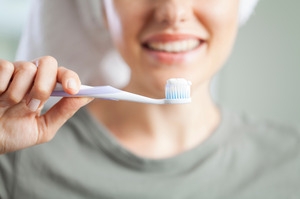Dental emergencies such as severe toothaches can happen to anyone, and they usually strike when you’re not expecting them. While your dentist has multiple options for treating a wide variety of urgent dental problems, it’s obviously better if you can avoid emergency situations altogether. And while there’s no way to guarantee that you never encounter any dental emergencies, following these 5 tips can make them much less likely to occur.
1. Replace Your Toothbrush on a Regular Basis
Brushing your teeth every day is one of the most basic steps you can take to protect your smile. However, it’s important to remember that that the bristles of your toothbrush will become worn or splayed over time, making them much less effective for cleaning your enamel. It’s recommended that you switch toothbrushes once every three months. An easy way to remember is to buy a new toothbrush whenever the seasons change.
2. Stay Hydrated
A dry mouth can put you at a higher risk for tooth decay and gum disease. To make sure that your mouth stays moist, you need to drink plenty of water throughout the day. Your body will use the water to make saliva that can wash away harmful bacteria as well as any food particles that might be left in your mouth after snacks or meals.
3. Drop Any Bad Chewing Habits
Do you sometimes bite your nails or chew on the end of your pen? You might not think much of these habits, but they can wear down your enamel over time; if you’re not careful, you might even crack a tooth. As such, you should make an effort to break any bad chewing habits as soon as you can. One strategy is to start chewing sugarless gum instead. Not only is it easier on your teeth, but it also encourages the mouth to produce more cleansing saliva.
4. Do Not Use Your Teeth as Tools
It can be tempting to tear open packages with your teeth, but doing so can result in chipped or fractured enamel. And if the packaging includes any hard plastics, there could be an added risk of injuring your gums. To keep your smile safe, take the time to look for scissors or another appropriate opening tool.
5. Remember to Visit Your Dentist
Even if your teeth and gums feel fine, there might be a problem you’re not aware of developing in your mouth. If the small issues aren’t caught and addressed early, they can eventually lead to dental emergencies. For this reason, you should visit your dentist once every six months; they can thoroughly examine your smile for warning signs of decay and disease, and they can treat any problem areas before they lead to serious oral health complications.
About the Author
Dr. Les Latner graduated from the Washington University School of Dental Medicine in St. Louis. He is affiliated with many different dental associations, including the Western Los Angeles Dental Society and the California Dental Association. He offers same-day appointments for patients who are suffering from dental emergencies. To schedule a consultation with Dr. Latner at Westside Dental Associates in Los Angeles, visit his website or call (310) 765-7441.


